Financial Reporting: Objectives, Concepts, and Accounting Assumptions
VerifiedAdded on 2021/01/01
|9
|1901
|173
Report
AI Summary
This report provides a comprehensive overview of financial reporting, beginning with an introduction to the process and its significance for stakeholders. It delves into the conceptual framework, explaining its role in guiding organizations in financial statement preparation, and the objectives of financial reporting, including providing useful data for decision-making and assessing company performance. The report then explores fundamental concepts, such as relevance and faithful representation, as well as enhancing qualities like comparability and understandability. It also covers key accounting concepts like recognition, measurement, and disclosure, and examines basic assumptions such as economic entity, going concern, monetary unit, periodicity, and accrual basis. The conclusion summarizes the importance of adhering to these principles and regulations for transparent and accurate financial reporting. The report also includes a list of references, with books, journals and online sources.

Financial Reporting
Paraphrase This Document
Need a fresh take? Get an instant paraphrase of this document with our AI Paraphraser
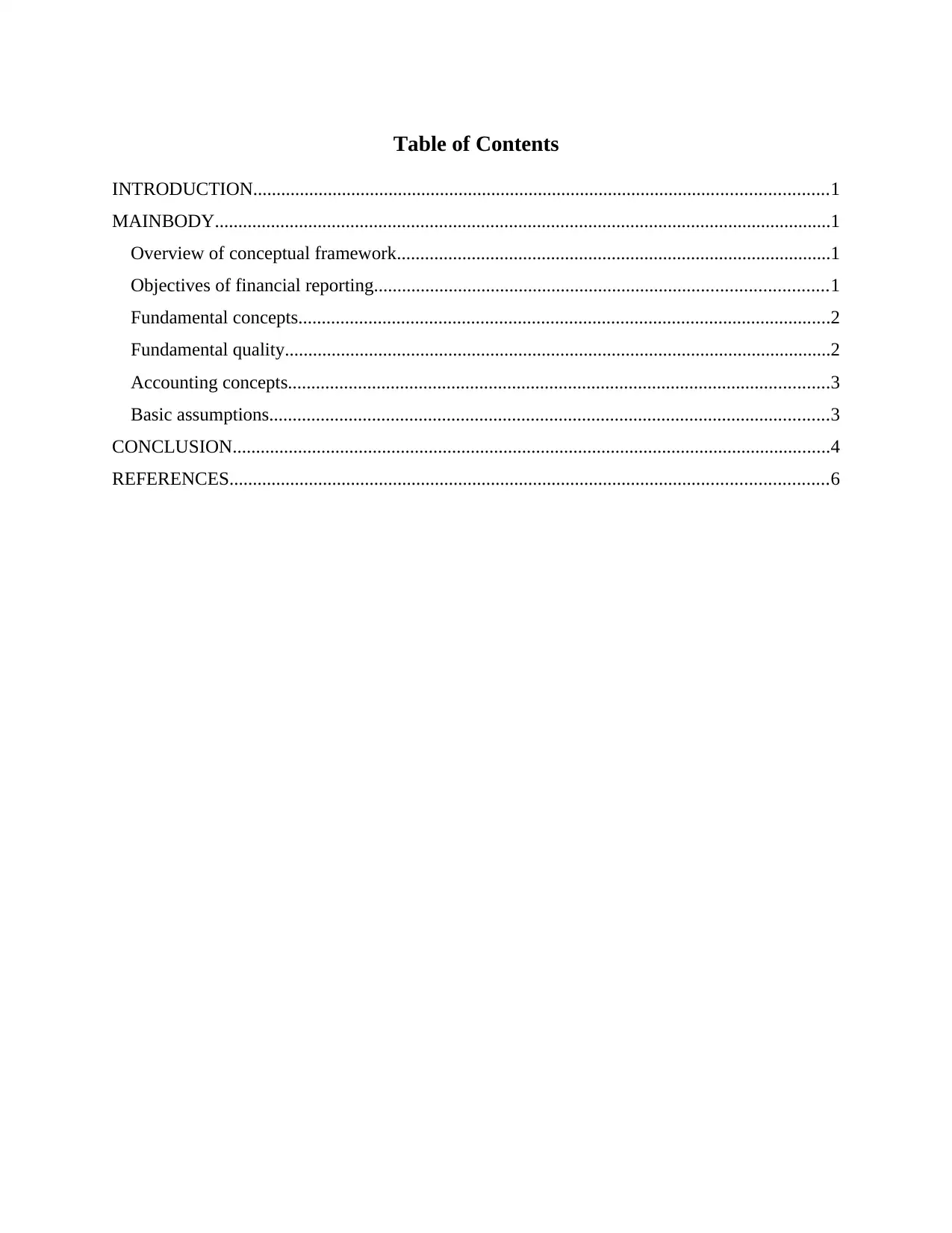
Table of Contents
INTRODUCTION...........................................................................................................................1
MAINBODY....................................................................................................................................1
Overview of conceptual framework.............................................................................................1
Objectives of financial reporting.................................................................................................1
Fundamental concepts..................................................................................................................2
Fundamental quality.....................................................................................................................2
Accounting concepts....................................................................................................................3
Basic assumptions........................................................................................................................3
CONCLUSION................................................................................................................................4
REFERENCES................................................................................................................................6
INTRODUCTION...........................................................................................................................1
MAINBODY....................................................................................................................................1
Overview of conceptual framework.............................................................................................1
Objectives of financial reporting.................................................................................................1
Fundamental concepts..................................................................................................................2
Fundamental quality.....................................................................................................................2
Accounting concepts....................................................................................................................3
Basic assumptions........................................................................................................................3
CONCLUSION................................................................................................................................4
REFERENCES................................................................................................................................6

⊘ This is a preview!⊘
Do you want full access?
Subscribe today to unlock all pages.

Trusted by 1+ million students worldwide
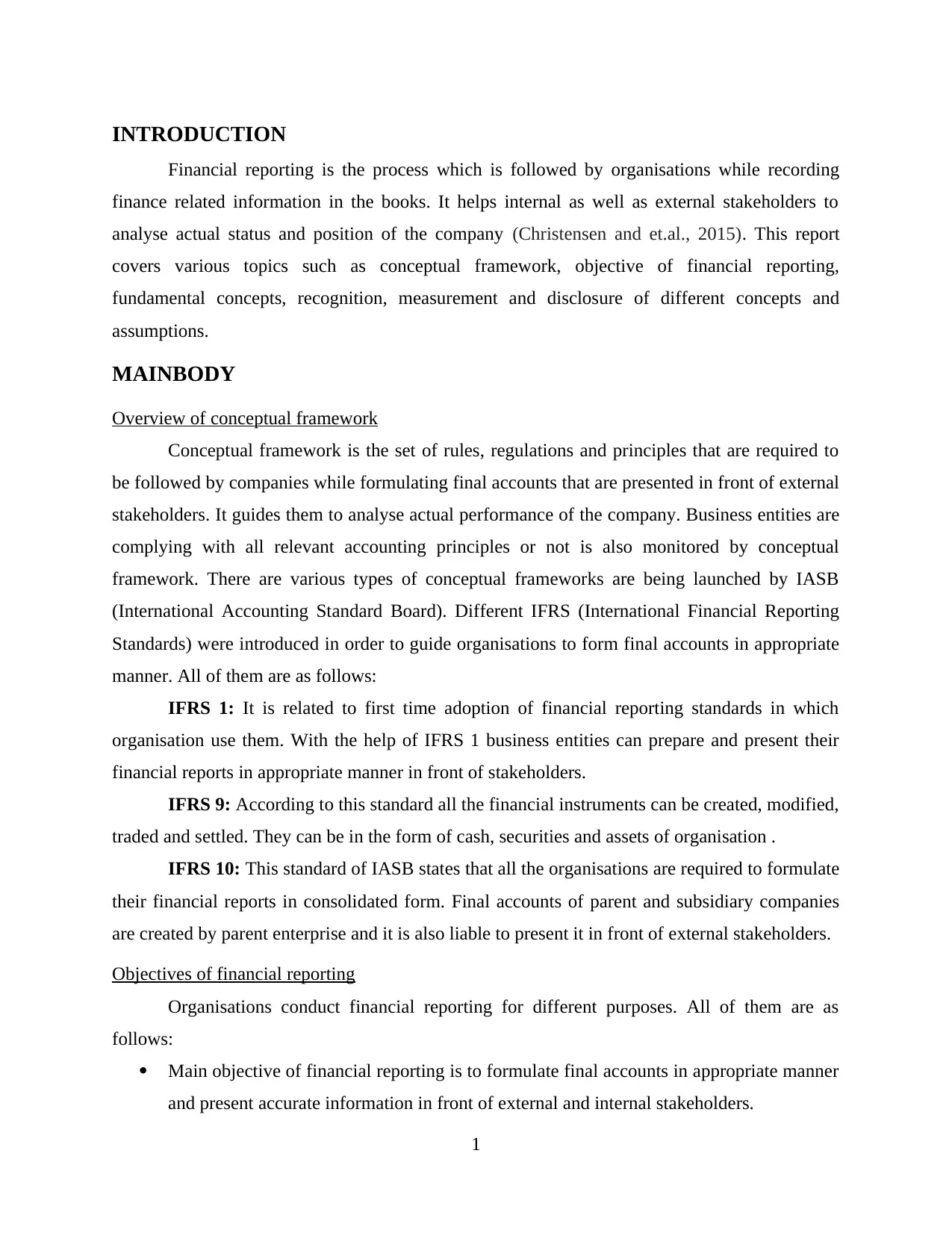
INTRODUCTION
Financial reporting is the process which is followed by organisations while recording
finance related information in the books. It helps internal as well as external stakeholders to
analyse actual status and position of the company (Christensen and et.al., 2015). This report
covers various topics such as conceptual framework, objective of financial reporting,
fundamental concepts, recognition, measurement and disclosure of different concepts and
assumptions.
MAINBODY
Overview of conceptual framework
Conceptual framework is the set of rules, regulations and principles that are required to
be followed by companies while formulating final accounts that are presented in front of external
stakeholders. It guides them to analyse actual performance of the company. Business entities are
complying with all relevant accounting principles or not is also monitored by conceptual
framework. There are various types of conceptual frameworks are being launched by IASB
(International Accounting Standard Board). Different IFRS (International Financial Reporting
Standards) were introduced in order to guide organisations to form final accounts in appropriate
manner. All of them are as follows:
IFRS 1: It is related to first time adoption of financial reporting standards in which
organisation use them. With the help of IFRS 1 business entities can prepare and present their
financial reports in appropriate manner in front of stakeholders.
IFRS 9: According to this standard all the financial instruments can be created, modified,
traded and settled. They can be in the form of cash, securities and assets of organisation .
IFRS 10: This standard of IASB states that all the organisations are required to formulate
their financial reports in consolidated form. Final accounts of parent and subsidiary companies
are created by parent enterprise and it is also liable to present it in front of external stakeholders.
Objectives of financial reporting
Organisations conduct financial reporting for different purposes. All of them are as
follows:
Main objective of financial reporting is to formulate final accounts in appropriate manner
and present accurate information in front of external and internal stakeholders.
1
Financial reporting is the process which is followed by organisations while recording
finance related information in the books. It helps internal as well as external stakeholders to
analyse actual status and position of the company (Christensen and et.al., 2015). This report
covers various topics such as conceptual framework, objective of financial reporting,
fundamental concepts, recognition, measurement and disclosure of different concepts and
assumptions.
MAINBODY
Overview of conceptual framework
Conceptual framework is the set of rules, regulations and principles that are required to
be followed by companies while formulating final accounts that are presented in front of external
stakeholders. It guides them to analyse actual performance of the company. Business entities are
complying with all relevant accounting principles or not is also monitored by conceptual
framework. There are various types of conceptual frameworks are being launched by IASB
(International Accounting Standard Board). Different IFRS (International Financial Reporting
Standards) were introduced in order to guide organisations to form final accounts in appropriate
manner. All of them are as follows:
IFRS 1: It is related to first time adoption of financial reporting standards in which
organisation use them. With the help of IFRS 1 business entities can prepare and present their
financial reports in appropriate manner in front of stakeholders.
IFRS 9: According to this standard all the financial instruments can be created, modified,
traded and settled. They can be in the form of cash, securities and assets of organisation .
IFRS 10: This standard of IASB states that all the organisations are required to formulate
their financial reports in consolidated form. Final accounts of parent and subsidiary companies
are created by parent enterprise and it is also liable to present it in front of external stakeholders.
Objectives of financial reporting
Organisations conduct financial reporting for different purposes. All of them are as
follows:
Main objective of financial reporting is to formulate final accounts in appropriate manner
and present accurate information in front of external and internal stakeholders.
1
Paraphrase This Document
Need a fresh take? Get an instant paraphrase of this document with our AI Paraphraser
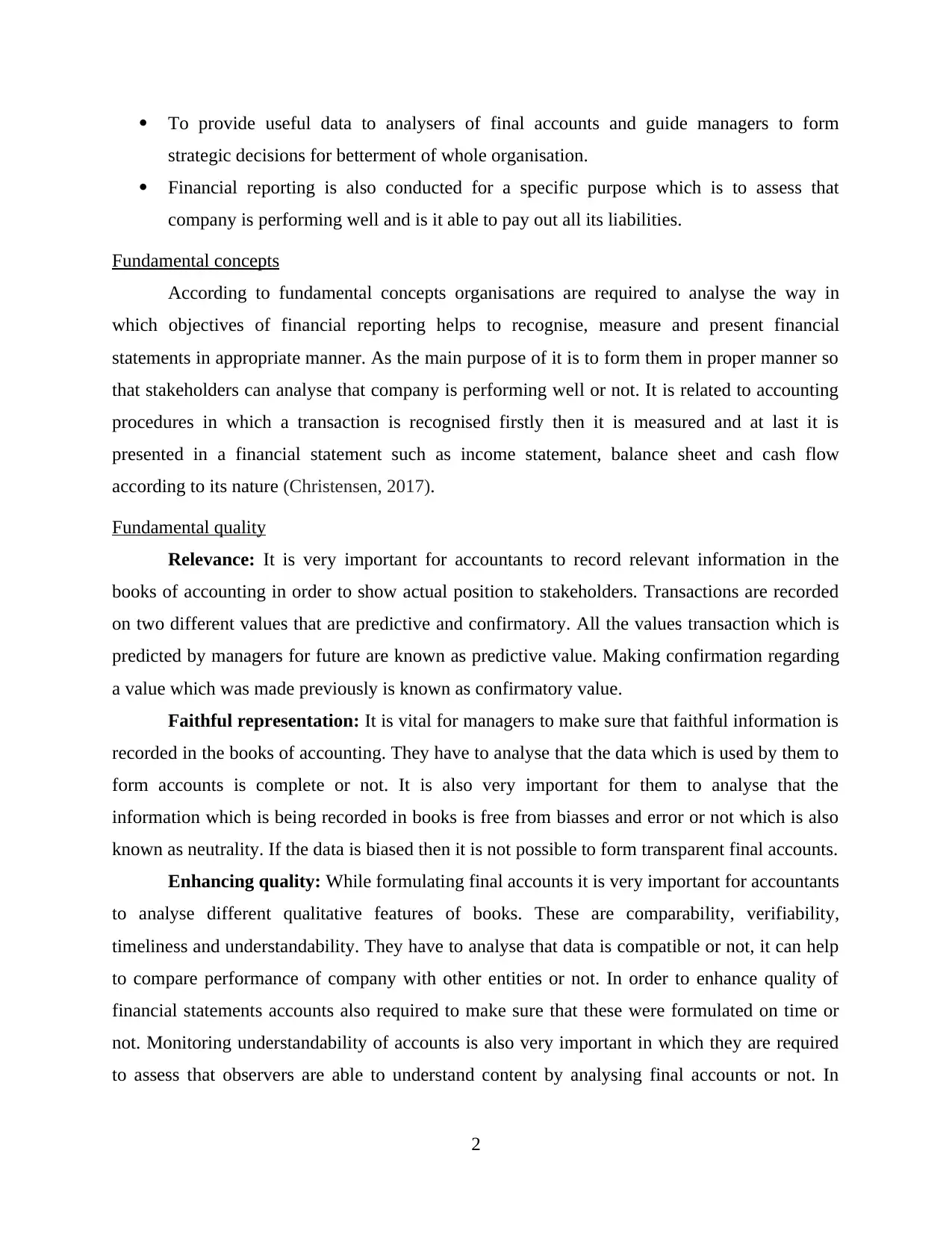
To provide useful data to analysers of final accounts and guide managers to form
strategic decisions for betterment of whole organisation.
Financial reporting is also conducted for a specific purpose which is to assess that
company is performing well and is it able to pay out all its liabilities.
Fundamental concepts
According to fundamental concepts organisations are required to analyse the way in
which objectives of financial reporting helps to recognise, measure and present financial
statements in appropriate manner. As the main purpose of it is to form them in proper manner so
that stakeholders can analyse that company is performing well or not. It is related to accounting
procedures in which a transaction is recognised firstly then it is measured and at last it is
presented in a financial statement such as income statement, balance sheet and cash flow
according to its nature (Christensen, 2017).
Fundamental quality
Relevance: It is very important for accountants to record relevant information in the
books of accounting in order to show actual position to stakeholders. Transactions are recorded
on two different values that are predictive and confirmatory. All the values transaction which is
predicted by managers for future are known as predictive value. Making confirmation regarding
a value which was made previously is known as confirmatory value.
Faithful representation: It is vital for managers to make sure that faithful information is
recorded in the books of accounting. They have to analyse that the data which is used by them to
form accounts is complete or not. It is also very important for them to analyse that the
information which is being recorded in books is free from biasses and error or not which is also
known as neutrality. If the data is biased then it is not possible to form transparent final accounts.
Enhancing quality: While formulating final accounts it is very important for accountants
to analyse different qualitative features of books. These are comparability, verifiability,
timeliness and understandability. They have to analyse that data is compatible or not, it can help
to compare performance of company with other entities or not. In order to enhance quality of
financial statements accounts also required to make sure that these were formulated on time or
not. Monitoring understandability of accounts is also very important in which they are required
to assess that observers are able to understand content by analysing final accounts or not. In
2
strategic decisions for betterment of whole organisation.
Financial reporting is also conducted for a specific purpose which is to assess that
company is performing well and is it able to pay out all its liabilities.
Fundamental concepts
According to fundamental concepts organisations are required to analyse the way in
which objectives of financial reporting helps to recognise, measure and present financial
statements in appropriate manner. As the main purpose of it is to form them in proper manner so
that stakeholders can analyse that company is performing well or not. It is related to accounting
procedures in which a transaction is recognised firstly then it is measured and at last it is
presented in a financial statement such as income statement, balance sheet and cash flow
according to its nature (Christensen, 2017).
Fundamental quality
Relevance: It is very important for accountants to record relevant information in the
books of accounting in order to show actual position to stakeholders. Transactions are recorded
on two different values that are predictive and confirmatory. All the values transaction which is
predicted by managers for future are known as predictive value. Making confirmation regarding
a value which was made previously is known as confirmatory value.
Faithful representation: It is vital for managers to make sure that faithful information is
recorded in the books of accounting. They have to analyse that the data which is used by them to
form accounts is complete or not. It is also very important for them to analyse that the
information which is being recorded in books is free from biasses and error or not which is also
known as neutrality. If the data is biased then it is not possible to form transparent final accounts.
Enhancing quality: While formulating final accounts it is very important for accountants
to analyse different qualitative features of books. These are comparability, verifiability,
timeliness and understandability. They have to analyse that data is compatible or not, it can help
to compare performance of company with other entities or not. In order to enhance quality of
financial statements accounts also required to make sure that these were formulated on time or
not. Monitoring understandability of accounts is also very important in which they are required
to assess that observers are able to understand content by analysing final accounts or not. In
2
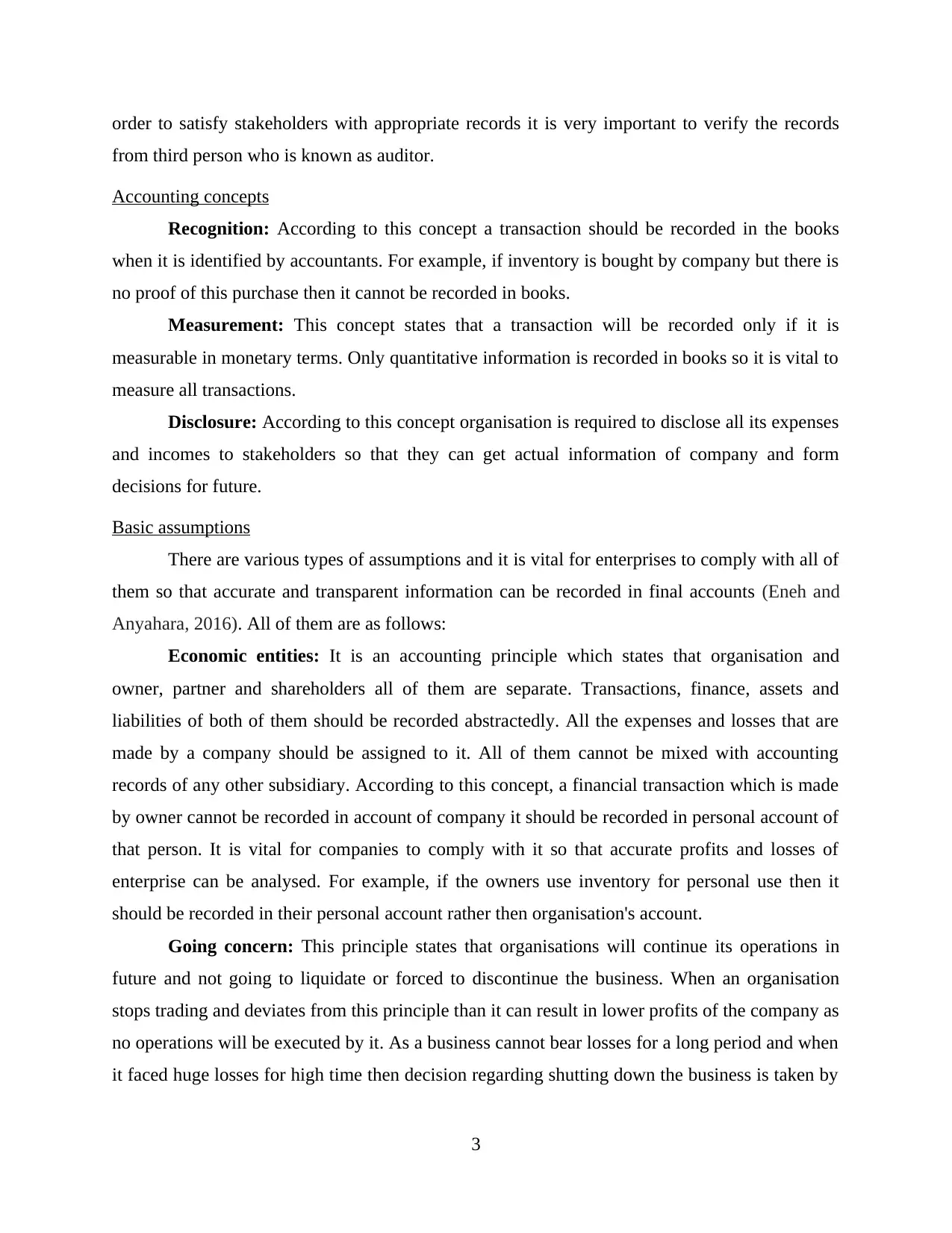
order to satisfy stakeholders with appropriate records it is very important to verify the records
from third person who is known as auditor.
Accounting concepts
Recognition: According to this concept a transaction should be recorded in the books
when it is identified by accountants. For example, if inventory is bought by company but there is
no proof of this purchase then it cannot be recorded in books.
Measurement: This concept states that a transaction will be recorded only if it is
measurable in monetary terms. Only quantitative information is recorded in books so it is vital to
measure all transactions.
Disclosure: According to this concept organisation is required to disclose all its expenses
and incomes to stakeholders so that they can get actual information of company and form
decisions for future.
Basic assumptions
There are various types of assumptions and it is vital for enterprises to comply with all of
them so that accurate and transparent information can be recorded in final accounts (Eneh and
Anyahara, 2016). All of them are as follows:
Economic entities: It is an accounting principle which states that organisation and
owner, partner and shareholders all of them are separate. Transactions, finance, assets and
liabilities of both of them should be recorded abstractedly. All the expenses and losses that are
made by a company should be assigned to it. All of them cannot be mixed with accounting
records of any other subsidiary. According to this concept, a financial transaction which is made
by owner cannot be recorded in account of company it should be recorded in personal account of
that person. It is vital for companies to comply with it so that accurate profits and losses of
enterprise can be analysed. For example, if the owners use inventory for personal use then it
should be recorded in their personal account rather then organisation's account.
Going concern: This principle states that organisations will continue its operations in
future and not going to liquidate or forced to discontinue the business. When an organisation
stops trading and deviates from this principle than it can result in lower profits of the company as
no operations will be executed by it. As a business cannot bear losses for a long period and when
it faced huge losses for high time then decision regarding shutting down the business is taken by
3
from third person who is known as auditor.
Accounting concepts
Recognition: According to this concept a transaction should be recorded in the books
when it is identified by accountants. For example, if inventory is bought by company but there is
no proof of this purchase then it cannot be recorded in books.
Measurement: This concept states that a transaction will be recorded only if it is
measurable in monetary terms. Only quantitative information is recorded in books so it is vital to
measure all transactions.
Disclosure: According to this concept organisation is required to disclose all its expenses
and incomes to stakeholders so that they can get actual information of company and form
decisions for future.
Basic assumptions
There are various types of assumptions and it is vital for enterprises to comply with all of
them so that accurate and transparent information can be recorded in final accounts (Eneh and
Anyahara, 2016). All of them are as follows:
Economic entities: It is an accounting principle which states that organisation and
owner, partner and shareholders all of them are separate. Transactions, finance, assets and
liabilities of both of them should be recorded abstractedly. All the expenses and losses that are
made by a company should be assigned to it. All of them cannot be mixed with accounting
records of any other subsidiary. According to this concept, a financial transaction which is made
by owner cannot be recorded in account of company it should be recorded in personal account of
that person. It is vital for companies to comply with it so that accurate profits and losses of
enterprise can be analysed. For example, if the owners use inventory for personal use then it
should be recorded in their personal account rather then organisation's account.
Going concern: This principle states that organisations will continue its operations in
future and not going to liquidate or forced to discontinue the business. When an organisation
stops trading and deviates from this principle than it can result in lower profits of the company as
no operations will be executed by it. As a business cannot bear losses for a long period and when
it faced huge losses for high time then decision regarding shutting down the business is taken by
3
⊘ This is a preview!⊘
Do you want full access?
Subscribe today to unlock all pages.

Trusted by 1+ million students worldwide
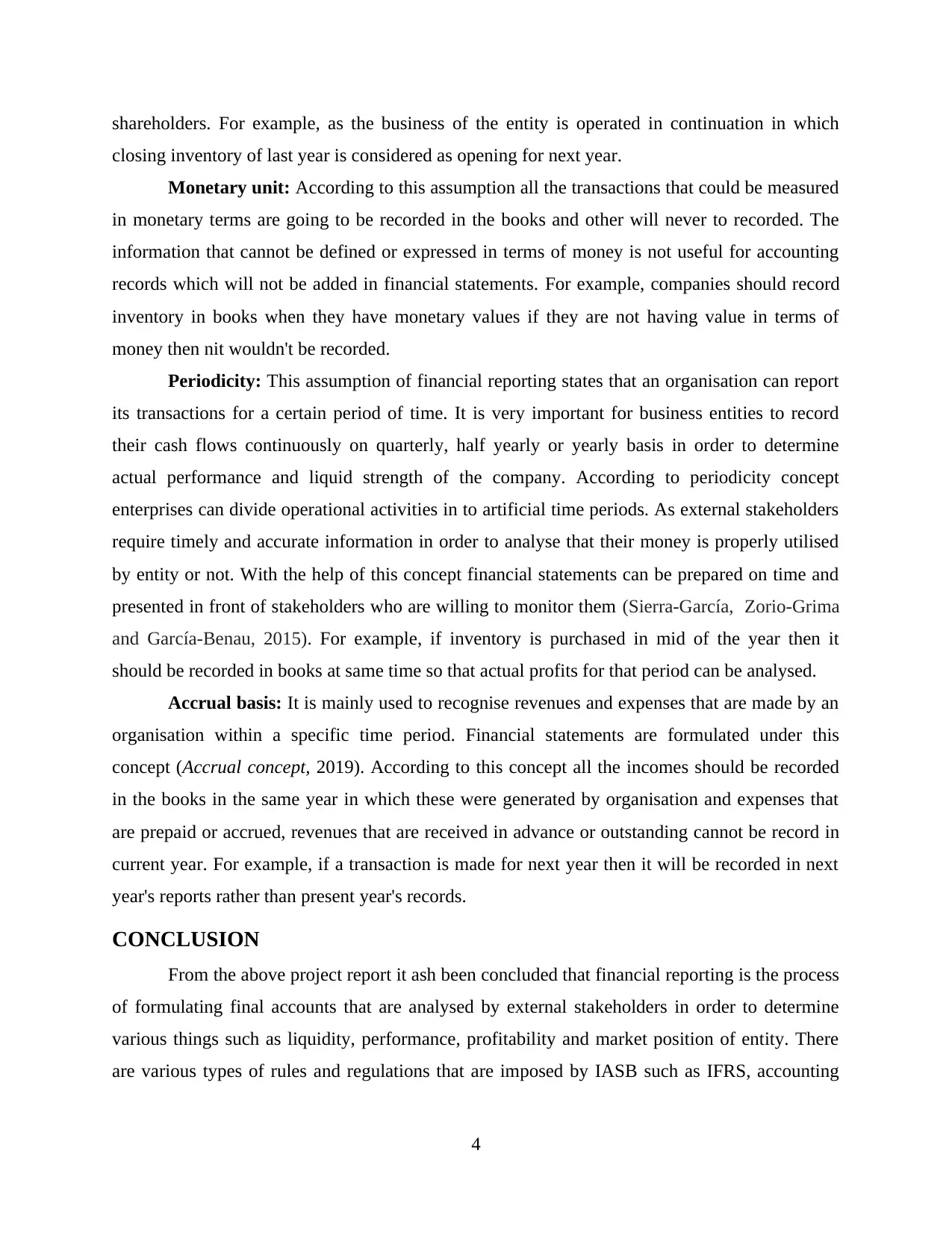
shareholders. For example, as the business of the entity is operated in continuation in which
closing inventory of last year is considered as opening for next year.
Monetary unit: According to this assumption all the transactions that could be measured
in monetary terms are going to be recorded in the books and other will never to recorded. The
information that cannot be defined or expressed in terms of money is not useful for accounting
records which will not be added in financial statements. For example, companies should record
inventory in books when they have monetary values if they are not having value in terms of
money then nit wouldn't be recorded.
Periodicity: This assumption of financial reporting states that an organisation can report
its transactions for a certain period of time. It is very important for business entities to record
their cash flows continuously on quarterly, half yearly or yearly basis in order to determine
actual performance and liquid strength of the company. According to periodicity concept
enterprises can divide operational activities in to artificial time periods. As external stakeholders
require timely and accurate information in order to analyse that their money is properly utilised
by entity or not. With the help of this concept financial statements can be prepared on time and
presented in front of stakeholders who are willing to monitor them (Sierra‐García, Zorio‐Grima
and García‐Benau, 2015). For example, if inventory is purchased in mid of the year then it
should be recorded in books at same time so that actual profits for that period can be analysed.
Accrual basis: It is mainly used to recognise revenues and expenses that are made by an
organisation within a specific time period. Financial statements are formulated under this
concept (Accrual concept, 2019). According to this concept all the incomes should be recorded
in the books in the same year in which these were generated by organisation and expenses that
are prepaid or accrued, revenues that are received in advance or outstanding cannot be record in
current year. For example, if a transaction is made for next year then it will be recorded in next
year's reports rather than present year's records.
CONCLUSION
From the above project report it ash been concluded that financial reporting is the process
of formulating final accounts that are analysed by external stakeholders in order to determine
various things such as liquidity, performance, profitability and market position of entity. There
are various types of rules and regulations that are imposed by IASB such as IFRS, accounting
4
closing inventory of last year is considered as opening for next year.
Monetary unit: According to this assumption all the transactions that could be measured
in monetary terms are going to be recorded in the books and other will never to recorded. The
information that cannot be defined or expressed in terms of money is not useful for accounting
records which will not be added in financial statements. For example, companies should record
inventory in books when they have monetary values if they are not having value in terms of
money then nit wouldn't be recorded.
Periodicity: This assumption of financial reporting states that an organisation can report
its transactions for a certain period of time. It is very important for business entities to record
their cash flows continuously on quarterly, half yearly or yearly basis in order to determine
actual performance and liquid strength of the company. According to periodicity concept
enterprises can divide operational activities in to artificial time periods. As external stakeholders
require timely and accurate information in order to analyse that their money is properly utilised
by entity or not. With the help of this concept financial statements can be prepared on time and
presented in front of stakeholders who are willing to monitor them (Sierra‐García, Zorio‐Grima
and García‐Benau, 2015). For example, if inventory is purchased in mid of the year then it
should be recorded in books at same time so that actual profits for that period can be analysed.
Accrual basis: It is mainly used to recognise revenues and expenses that are made by an
organisation within a specific time period. Financial statements are formulated under this
concept (Accrual concept, 2019). According to this concept all the incomes should be recorded
in the books in the same year in which these were generated by organisation and expenses that
are prepaid or accrued, revenues that are received in advance or outstanding cannot be record in
current year. For example, if a transaction is made for next year then it will be recorded in next
year's reports rather than present year's records.
CONCLUSION
From the above project report it ash been concluded that financial reporting is the process
of formulating final accounts that are analysed by external stakeholders in order to determine
various things such as liquidity, performance, profitability and market position of entity. There
are various types of rules and regulations that are imposed by IASB such as IFRS, accounting
4
Paraphrase This Document
Need a fresh take? Get an instant paraphrase of this document with our AI Paraphraser

principles and concepts. It is very important for organisations to comply with all of them so that
financial statements can be formulated in a proper format.
5
financial statements can be formulated in a proper format.
5
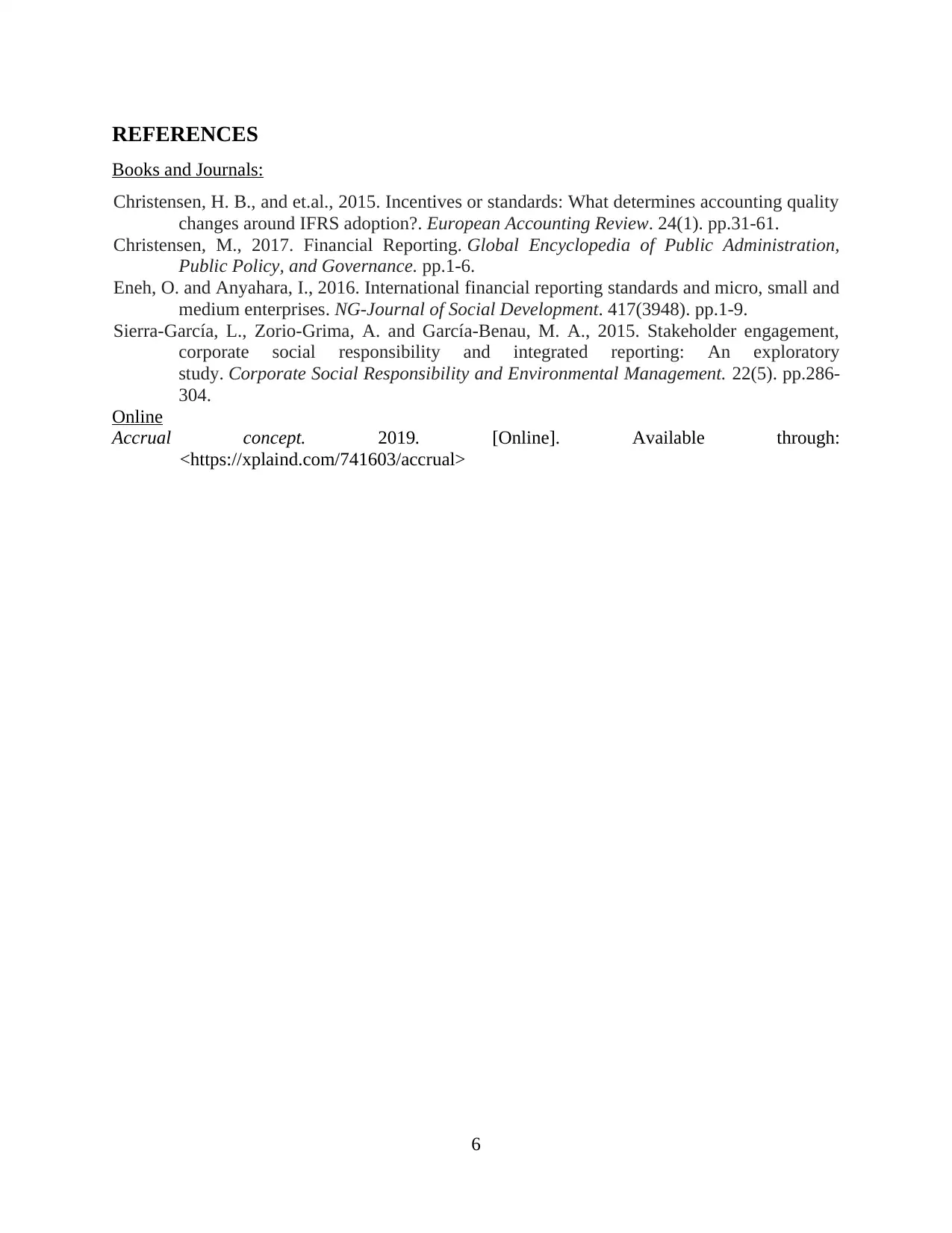
REFERENCES
Books and Journals:
Christensen, H. B., and et.al., 2015. Incentives or standards: What determines accounting quality
changes around IFRS adoption?. European Accounting Review. 24(1). pp.31-61.
Christensen, M., 2017. Financial Reporting. Global Encyclopedia of Public Administration,
Public Policy, and Governance. pp.1-6.
Eneh, O. and Anyahara, I., 2016. International financial reporting standards and micro, small and
medium enterprises. NG-Journal of Social Development. 417(3948). pp.1-9.
Sierra‐García, L., Zorio‐Grima, A. and García‐Benau, M. A., 2015. Stakeholder engagement,
corporate social responsibility and integrated reporting: An exploratory
study. Corporate Social Responsibility and Environmental Management. 22(5). pp.286-
304.
Online
Accrual concept. 2019. [Online]. Available through:
<https://xplaind.com/741603/accrual>
6
Books and Journals:
Christensen, H. B., and et.al., 2015. Incentives or standards: What determines accounting quality
changes around IFRS adoption?. European Accounting Review. 24(1). pp.31-61.
Christensen, M., 2017. Financial Reporting. Global Encyclopedia of Public Administration,
Public Policy, and Governance. pp.1-6.
Eneh, O. and Anyahara, I., 2016. International financial reporting standards and micro, small and
medium enterprises. NG-Journal of Social Development. 417(3948). pp.1-9.
Sierra‐García, L., Zorio‐Grima, A. and García‐Benau, M. A., 2015. Stakeholder engagement,
corporate social responsibility and integrated reporting: An exploratory
study. Corporate Social Responsibility and Environmental Management. 22(5). pp.286-
304.
Online
Accrual concept. 2019. [Online]. Available through:
<https://xplaind.com/741603/accrual>
6
⊘ This is a preview!⊘
Do you want full access?
Subscribe today to unlock all pages.

Trusted by 1+ million students worldwide
1 out of 9
Related Documents
Your All-in-One AI-Powered Toolkit for Academic Success.
+13062052269
info@desklib.com
Available 24*7 on WhatsApp / Email
![[object Object]](/_next/static/media/star-bottom.7253800d.svg)
Unlock your academic potential
Copyright © 2020–2026 A2Z Services. All Rights Reserved. Developed and managed by ZUCOL.




